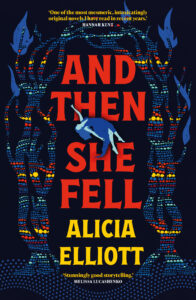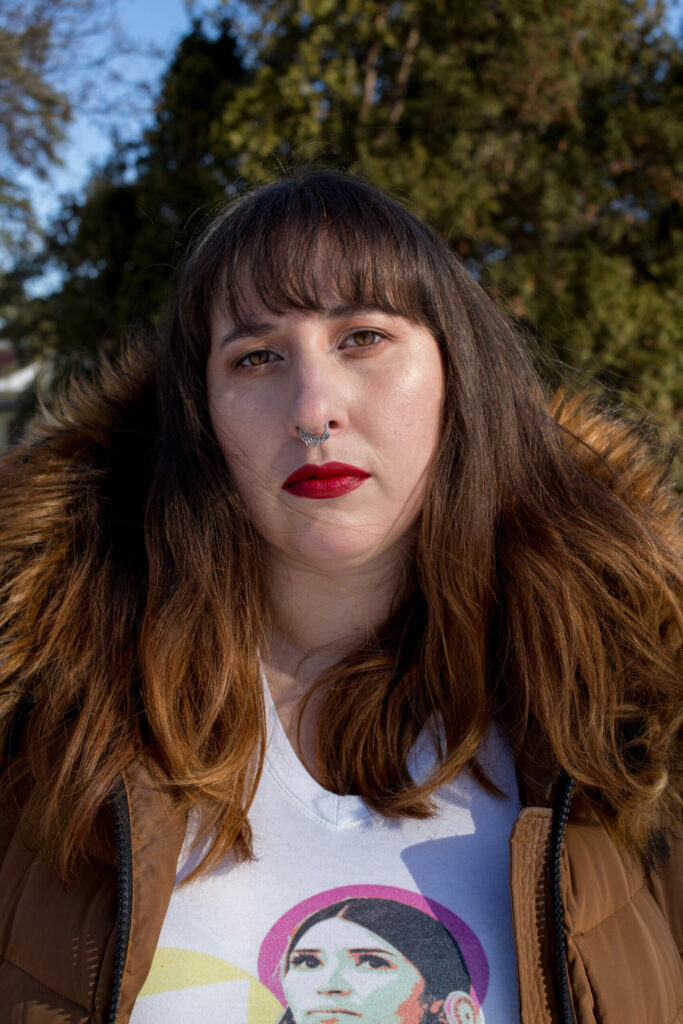And Then She Fell, by US author Alicia Elliott, is a mind-bending and slinking novel unpacking themes of motherhood, mental health, Indigeneity, dispossession and connection to land and culture – all of which remain key themes in our contemporary Australian landscape. BroadAgenda editor Ginger Gorman had a chat with Alicia over email. (We’ve kept Alicia’s US word spellings to be true to her voice.)
Alicia thank you for your wonderful, compelling book! It must have taken some courage to write. Firstly, tell us a little bit about you and who you are.
I’m a white-passing Mohawk woman whose paternal family is from Six Nations of the Grand River Reserve in Canada. I write and edit. I love horror and professional wrestling, which have more in common than you’d think.
What inspired you to write this book? How much of it was triggered by your own experiences?
This book originally started as a short story about the experience of being a new mother. I had my son when I was 18, and I felt in some ways tricked about what being a new mom actually looked and felt like – not just emotionally, but also physically, in my body.
It seemed like there was some big conspiracy to keep us from knowing the full, often ugly truth of what it takes to care for a newborn infant.
The story never seemed finished, though, so I put it away, taking it out from time to time to tinker with it. It was only when I started reflecting on my own love of genre-bending work, and considering that the protagonist of another short story that I couldn’t figure out was actually the same protagonist for this story, that I realized these were the missing pieces that would slide the entire thing into focus. And so it became a novel!
Rather surprisingly, after I decided that Alice would be struggling with psychosis, I ended up having a full manic episode with psychosis myself. It took a while to come down from that and be able to look back and assess the situation clearly. When I did, though, it illuminated the experience of psychosis for me. I knew that everything I assumed about the experience was totally wrong – and I knew intimately what stereotypes were levied against people in the thrall of psychosis, and the devastating pain it produced. All of this helped me shape the novel into what it is now.

The cover of “And Then She Fell.” Image: Supplied
Tell us a bit about Alice. Who is she as a character?
Alice is funny, caring, and insightful, with a deep sense of duty – too deep, in fact. Since she was young, Alice has had to carry far more responsibility than many other kids her age, putting her in a position where she’s become used to putting everyone else’s needs, desires and expectations first.
This has, unfortunately, developed into a belief that you show others you love them by forcing yourself to become whatever they want or need you to be, even if it hurts you. It’s very hard for Alice to understand who she is separate from those she loves and cares for, or for her to value herself apart from what she’s able to do for those around her.
Why is her Indigenous identity such an important lens on this story? How does it intersect with other parts of her life – such as her relationship with her white husband and neighbours?
Having lived on the Six Nations reserve her whole life, Alice is acutely aware of what reserves were actually designed for: to isolate her people and push them into ruin, ideally forcing them to move into cities and give up their identity, language and culture, so that Canada no longer had to uphold any historical treaties made with them. Which means she’s also just as aware of the unintended side effect of reserves: that our people were all together, and therefore could keep our language and culture alive – at least, as much as was possible, considering the laws Canadian politicians were continually passing forbidding us to do so.
White people, who society has ensured do not have to face these histories every day, can therefore easily relegate all of it to some distant past. Or worse: they can altogether ignore it.
For Alice and her family, on the other hand, this history of dispossession, intergenerational trauma, and cultural and linguistic genocide lives in their every action and possibility, in their very genes.
They couldn’t ignore it if they tried. In fact, the more Alice tries to ignore this and pretend that everything is fine to assuage her white husband and neighbours, who are uncomfortable and passive aggressive whenever “race” is even mentioned, the more this history rears its head and forces her, and them, to acknowledge it.
Why have you chosen to really meet mental illness head on in this text (and often with great levity)?
After my own experience with psychosis and mania, it occurred to me how much I’d previously thought I knew and understood about them were not just wrong, but offensively wrong, contributing to stereotypes and injustice being levied against other mad folks. I wanted to use this text as a way to speak back to those assumptions.

Alicia Elliott. Picture: Alex Jacobs-Blum
As for the levity, I think that those who have experienced great despair are more likely to appreciate the power of humour, to understand the way it acts as a sort of nightlight, helping people to see, and hope, in the dark. Indigenous people are some of the funniest people I know, and so are other mad folks, so it felt important to incorporate that humour into the book.
And a related question to the one above. I’ve suffered from postpartum depression myself – and the feeling that you are failing as a parent/can’t bond with your baby. Why did you want to tackle this issue?
As I sort of hinted at above, I think there’s a lot of effort put into giving new parents the (false) impression that everything from pregnancy to childbirth to raising a child are pure and uncomplicated joys. While that does play into it, too, I found that there was also a lot of grief, guilt, despair and loneliness. The more I spoke to other parents about it in private, the more I realized that this complicated duality was the actual experience of parenthood – not the sort of joyous fairy tale we’ve all been lead to believe.
I think the more we normalize this experience of parenthood, the more we temper the expectations of new parents, the more we give new parents room to voice and then deal with their own difficulties. It’s important we look at these sorts of things realistically, not idealistically, because we live in the real world, not some imaginary ideal one. We all need to know we’re not alone.
Your book has been described as “intoxicatingly original.” And I agree, it was very hard to put down! Tell us a bit about your writing style. How do you write a book people can’t put down?
I’m a big fan of voice-driven fiction. If you develop a compelling enough voice, it doesn’t matter what you have the character doing, you’re going to make the reader want to stay with them through it. I wanted Alice’s voice to be that sort of compelling vehicle, especially since she was navigating early motherhood, which is generally—and in my opinion, unfairly—considered to be very boring to all who aren’t parents.
Is there anything else you want to say?
Obviously, I’m far too long-winded to be given this sort of question, but I’m also self-aware, so I’ll say no.
The post “It illuminated the experience of psychosis for me” appeared first on BroadAgenda.
This post was originally published on BroadAgenda.

